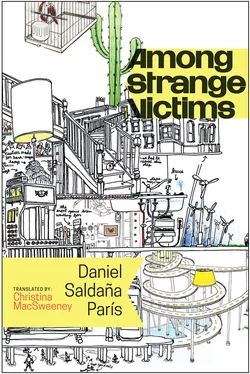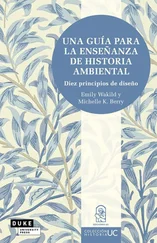Beatrice Langley, at the age of sixteen, watches the scene in silence from the safety of her anonymity within the train carriage. The pistol rises in slow motion until the barrel is perfectly horizontal, following the line of the man’s arm. It is an extension of his body, a rigid finger pointing to and condemning the fleeing woman. Bea has to twist around to see — at the end of that line that will soon, following the trajectory of the bullet, cease to be imaginary — the woman moving away, suspecting nothing.
Bea isn’t sure if she heard the shot. It seems to her that a sharp, painful whistle has occupied her head from the moment she saw the pistol to when the man, kneeling on the platform, all his elegance giving way to desperation and pain, is detained by the local police. The woman does not seem so much dead as to have disappeared, as if by magic, among the many folds of her dress, which spills over the platform like an octopus whose insides have been emptied out.
After the bustle has died down and the curious onlookers have moved on, after the corpse has been removed to the morgue, Bea continues to watch, as if hypnotized, the silent dialogue between the top hat, still lying on the bench, and the bloodstain, ten or fifteen yards away.
 A
A 
None of the warnings about the ugliness of Los Girasoles had prepared Marcelo Valente for what he would find there. The town was dull to the core of its streetlights; the members of the academic community, perhaps a little more isolated from the real world than he had noted in other such institutions, were in the habit of generating unfounded rumors at lightning speed, and the reigning endogamy was so deeply entrenched that — as Professor Velásquez informed him — he had hardly even arrived before the aesthetics department was abuzz with speculation about the immediate future of his single status. Velásquez gave him a quick, politically incorrect summary of the physical virtues of each of the female professors, laying particularly irritating emphasis on the size of their respective breasts and the fact that he, Velásquez, had been married to two of them. (“But the record’s held by Porter, a miserable little gringo professor who’s been here for six years and has already been married and divorced four times, each to a different member of the female teaching staff,” added Velásquez with an undisguised tinge of jealousy.)
Velásquez, despite the great romantic deeds he boasted of, was not a handsome man: short, potbellied, with graying hair on some areas of his scalp and the round glasses that had gone out of fashion three or four decades before. The prototype of the absentminded academic who manages to shine due to an unjustified confidence in himself and a glibness, not lacking in humor, that had to be — thought Marcelo — one of his most positive attributes.
The flight from Madrid to Mexico City had been easier and less tiring than Marcelo had expected; nothing like the multiple stopovers — Houston and then Lima — that had made his journey to Buenos Aires torture two years before, on a flight the university had gotten for free but that had cost him his mental equilibrium for two weeks, at the end of which he had promptly met Romina.
Descending into Mexico City, just before landing, he had been impressed by the interminable sea of small lights streaming up hillsides and along avenues like an inexhaustible flow of electricity. He had, nevertheless, expected more in the way of architecture; his idea of a metropolis was closer to Manhattan or a movie version of Tokyo: glass skyscrapers stretching to infinity, their façades mirroring the crisscrossing layers of cumulonimbi that darkened the afternoons with their threat of rain. In contrast, he discovered, from the descending plane, a sprawling city with low houses and the lines of the avenues emulating a nonfunctioning, disorganized sanguineous circulatory system.
In the airport, he had felt intimidated by the hardness of the local faces, the gaze — somewhere between humorous and scornful — of the customs officials, the friendliness of the unlicensed cabdrivers that masked a scam. He was to spend the night there in the city, close to the airport, and the next day Velásquez, who was in the capital on some personal business, would pick him up and drive him to Los Girasoles. It was, he was told, a six-hour journey, seven if there was traffic.
In Mexico City, Marcelo breathed air that, while foul and containing large quantities of lead, still held the glow of some ancient past. The dirty yellow line on the edge of the sidewalks, viewed from the cab, seemed to him a metaphor for just about everything, although he couldn’t say exactly why. A tone of violated legality hung over things, leaving an ample margin for nameless atrocities, but also, paradoxically, for the construction of an untroubled, dissipated style of life. Everything had two sides. Marcelo thought he would have liked to explore that city for several more days, even months: a blind pilgrimage over the pedestrian bridges, along the boulevards with their sad eucalyptus trees, and through the rich, noisy bustle of the itinerant markets. But he would come back later, he thought, when he would have time to get properly acquainted with the Distrito Federal’s sordid quaintness, the “defective” and the pure and simple “defect” of that blackened basin.
The hotel, a few minutes from the airport, was a mound of reinforced concrete and reflective windows with a neon sign at its apex. The sign alternated, according to the whim of the circuit breaker, between the words hotel and otel. The building overlooked the junction of two immense avenues, a noisy spot that promised to be constantly busy. Marcelo had asked the cabdriver at the airport to take him to any cheap hotel, reasonably nearby, since he had arranged to meet Velásquez for breakfast the next day in a restaurant in the same airport and then leave for the university town of Los Girasoles, where he was to fix his residence for the following year. The driver dropped Marcelo at the main entrance, and the moment he saw the place, the professor thought it showed no sign of adding anything positive to a first night in a city “charged with energy.” That was how he had formulated it to himself. Marcelo reconsidered his phrasing and was ashamed to find himself a doctor of contemporary rationality who was capable of uttering such an ambiguous cliché, an expression that, beyond the high-voltage cables running from pole to pole along the roadside, didn’t relate to anything in particular. But perhaps it wasn’t necessary that it did: the tangle of cables, exposed to the vagaries of the rains and the whims of earthquakes, was enough to leave one feeling no longer just concerned, but even deeply disturbed in one’s innermost being, attacked in that fraction of the soul one reserves for things that cannot be explained. This being the case, Marcelo went into the hotel as if affected by a premonition related to the energy resources of the nation offering him accommodation. None of that, he thought later, made any sense, but one does not select the weapons with which to assault one’s peace of mind.
The bed had a metal frame, and the sheets had circular burn marks. Marcelo feared there would be scorpions or enormous cockroaches on the walls — a friend had told him a dismal story about bugs in Mexico City — but after a cautious inspection, he decided he was safe. He thought that perhaps the cabdriver had misunderstood his instructions and, on hearing he was looking for a cheap hotel, had decided what the Spanish passenger wanted was prostitutes. The hotel certainly did look as if it were normally used on a by-the-hour basis. The decor in his room was rather ugly: two Chinese jars of fake porcelain (they were plastic to the touch) on a painted wood-veneer table. And between the jars, as if standing guard, a small TV.
Читать дальше

 A
A 







